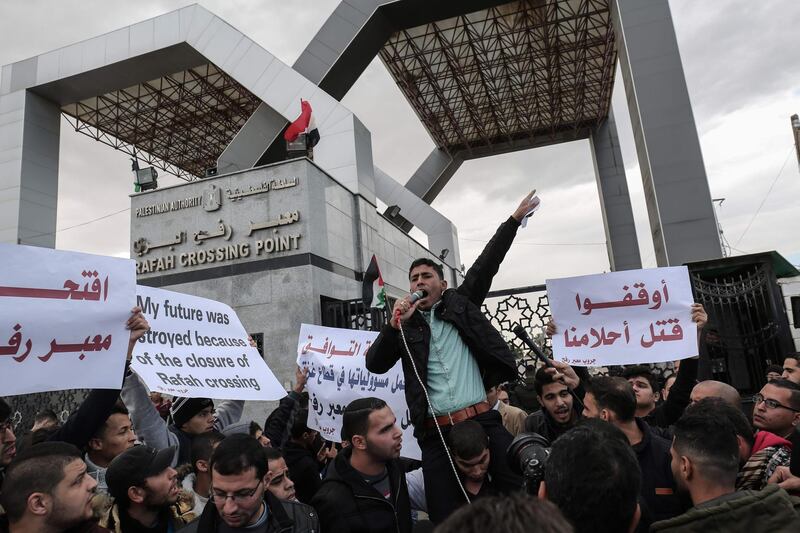Egypt's decision to close the Rafah border crossing with Gaza after Friday's horrific mosque attack has cast further doubt on the main benefit Gazans hoped for from reconciliation between Fatah and Hamas — access to the outside world.
Even before militants in North Sinai killed 305 worshippers in Bir Al Abd, it had become clear that Cairo was not ready to open Rafah on a regular basis despite Palestinian Authority (PA) security forces taking control of the crossing. The handover by Hamas on November 1 was part of the reconciliation agreement reached in Cairo on October 12.
Hamas official Salah Bardawil complained about this last week after returning from a round of follow-up talks on the deal in the Egyptian capital. He said the opening of the Rafah crossing had not even been discussed
"Unfortunately it was not possible to discuss this issue," he said in a video posted on social media. "The Palestinian people are going to suffer what they have been suffering for a longer period of time. That is our fate."
Egypt opened Rafah for three days from November 18 and had planned to open it for another three days from last Saturday. Now it is closed until further notice.
Over the past decade, the opening of the crossing has been subject to the vicissitudes of both Palestinian and Egyptian politics. The border was virtually shut in 2007 after Hamas seized power in the Gaza Strip, in parallel with Israel's draconian curbs on its Erez crossing with Gaza. Passage through Rafah was highly restricted until Mohamed Morsi, whose Muslim Brotherhood regime was close to Hamas, came to power in 2011. Egypt reimposed the tight closure after Abdel Fattah El Sisi ousted the Brotherhood in 2013 and was elected president.
According to the Israeli rights group Gisha (Access), Rafah was open for only 17 days in the first half of 2017, none consecutively.
____________________
Read more:
[ Hamas rejects disarmament talk ahead of reconciliation deadline ]
[ After the mosque attack, the map of jihadist forces in Sinai is changing ]
Hamas-Fatah deal raises hopes and cheers in Gaza
_____________________
Beginning in June, Hamas-Egypt relations improved dramatically, raising hopes Rafah would be opened. Egypt had in the past accused Hamas of supporting the Sinai insurgents and allowing them to use Gaza as a refuge. But now it expected Hamas to take security steps alongside Gaza's border with Sinai and become an ally in combating the insurgency. In return, Hamas leaders hoped the Egyptians would overturn their policy on Rafah.
In August, Mr Bardawil told Hamas's Al Aqsa television that Rafah would be opened only "intermittently" once renovations on the Egyptian side were finished. Egyptian intelligence, he said, was conditioning a complete opening on the achievement of "complete security" in Sinai. It seemed Egypt wanted to use Rafah as leverage to ensure Hamas rigorously applied the security steps.
After Hamas and Fatah reached a reconciliation agreement two months later and PA security forces took control of the crossing, Gazans expected Egypt would finally change its policy. But there were signs this expectation would not be quickly met, even before Friday's attack.
According to Mkhaimar Abusada, a political scientist at Gaza's Al Azhar University, the Egyptians made clear to Palestinian delegates in Cairo last week that use of Rafah would continue to be curtailed. "The Egyptians told the Palestinian delegates that they have concerns about the security of Palestinian travellers in Sinai [because of the insurgents] and that there is a security problem for the Palestinians themselves making the eight-hour drive from Rafah to Cairo."
Moreover, Mr Abusada said, the Egyptians wanted to restrict the flow of people from Gaza into Egypt because they had discovered that some of the insurgents staging attacks on Egyptian forces were Palestinians from Gaza.
The result of the Egyptian policy is widespread frustration. "Palestinians thought the closure was because of the Hamas takeover in 2007," Mr Abusada said. "With the reconciliation efforts, they were hopeful Rafah would be open again and that they would be able to get in and out like human beings. But now that seems illusory and it seems that Rafah may never be open again because of the security situation in Sinai."
Palestinians, he said "are very frustrated with the reconciliation and very disillusioned that Rafah won't be open".
According to Gisha, the Israeli rights group, about there are 30,000 Gazans waiting for a chance to exit through Rafah.
Menachem Klein, an Israeli scholar of Palestinian politics, is more sanguine about the future of reconciliation and the opening of Rafah. In his view, Friday's attack will only increase Egypt's determination to bring about Palestinian reconciliation. He expects Cairo to press PA president Mahmoud Abbas to be more flexible in negotiations and to lift sanctions he has maintained on Gazans, such as cutting salaries of PA workers and halting payments for electricity supplied to the Strip.
"Egypt is very determined to go ahead with reconciliation," said Mr Klein, who teaches at Bar Ilan University near Tel Aviv. "It needs stability and good security in the Gaza Strip and on the borders. If the humanitarian crisis continues in Gaza this is fertile ground for radical Islam and creates instability in Gaza which can move south-west into Sinai."
"I think that Egypt wants to normalise the Rafah crossing," he said. "It's in their interest that people be able to breathe and that life conditions be much better. Their main interest is to prevent religious radicalisation."





